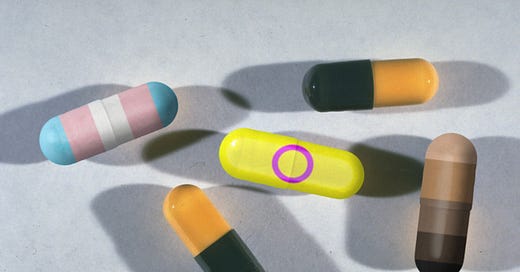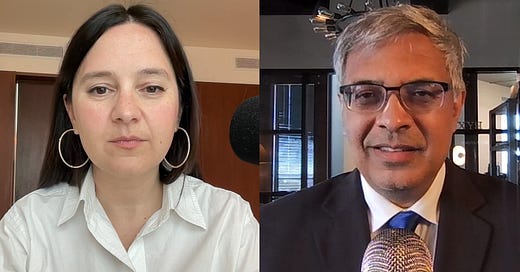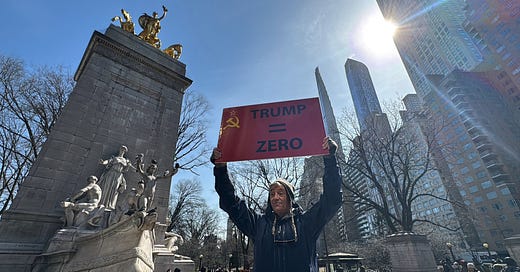
The Free Press

Mandatory ideological training has now come to the drugstore. In California, pharmacists and pharmacy technicians, in order to keep their license, must study the latest in gender identity, colonialism, and white privilege. Such “cultural competency” courses are required by a state law that went into effect this year.
When the bill was introduced, Democratic Assemblyman Christopher Ward, the lead sponsor, said that the continuing education class would help “ensure pharmacists are looking out for the well-being of LGBTQ+ individuals.”
Like many licensed professionals, pharmacists are required to take continuing education courses, usually with titles like “Chronic Obstructive Pulmonary Disorder (COPD)” and “Trimming Trends: Unveiling the Latest in Weight Management Guidelines.” Though this new training requires only an hour of the pharmacist’s time every two years, it’s another demonstration of compelling people to passively accept dubious assertions and assumptions, or risk losing their livelihoods.
One such course, titled Caring for All: The Pharmacy Professional’s Role in LGBTQ+ Health and Equity comes from the California Pharmacists Association (CPhA). The outline, obtained by The Free Press, features many charts that are hard to square with the duties of a pharmacist. There is a chart illustrating many “systems of oppression.” These include “sexism,” “cis-sexism,” “heterosexism,” and “adultism.”
Another chart describes “effects of colonialism and colonization on pre-colonial ways of being.” It states: “Racism creates race: otherness and whiteness.” Some of the pre-colonial ways of being pharmacists are taught include “two-spirit,” the term used by Native Americans to describe someone who has “both a masculine and feminine spirit.”
The training also suggests that pharmacists introduce a question about a customer’s gender at their first interaction. The course gives this prompt: “Hello, my name is Jay. I use they/them and he/him pronouns. How would you like me to address you?”
Click here to see a slide show of the training.
What does any of this have to do with being a pharmacist? Not much, said several pharmacists The Free Press spoke to.
Lisa Marino, 54, a hospital pharmacist in Los Angeles County, says the new cultural competency course provides nothing that relates to her job. “Our role is to aid in providing safe and appropriate use of medication for all people, regardless of culture, and with a respect for everyone’s privacy and dignity,” said Marino. “This feels like indoctrination.”
Joe, 50, who asked The Free Press not to use his last name, worked as a pharmacist for 25 years and owns an independent pharmacy in Los Angeles County. He says that respecting all customers, no matter their race or sexual orientation, is a given.
“To be a competent pharmacist, you need to know about medications, professional ethics, and the law,” said Joe. “That’s it.”
Dr. Carrie Mendoza is an emergency medicine physician and the recently appointed director of Genspect USA, an organization that seeks evidence-based treatments for people with gender distress. She says people are taught to be so hyper-sensitive to avoid offending people, especially to those in a designated “marginalized” group, that pharmacists may be afraid to bring up legitimate concerns. “A pharmacist might not raise medication safety concerns such as adverse effects [or] inappropriate dosing. . . out of fear they will be called discriminatory,” said Mendoza. “Political trainings like this undermine safety for all patients and should be immediately removed from our healthcare system.”
But one of the three CPhA cultural competency course authors, Dr. Tam Phan, an assistant professor of clinical pharmacy at the University of Southern California—and the clinical pharmacy program coordinator at the Los Angeles LGBT Center—told The Free Press in an email that a pharmacist’s role has expanded beyond quick interactions at the prescription counter.
“Pharmacist prescriptive authority in California has expanded to immunizations, hormonal contraceptives, travel medicine, nicotine replacement products, and HIV. . . treatments,” he wrote. “For pharmacists who are not interacting with patients directly, LGBTQ+ cultural sensitivity is still important since pharmacists should be knowledgeable of potential drug interactions between hormones being used in gender affirmation with the patient’s other medications.”
Maddie Rowley is an investigative reporter. Follow her on X @Maddie_Rowley. And read her piece, “Nonprofits Are Making Billions off the Border Crisis.”
To support more of our work, become a Free Press subscriber today:















When you consider that most pharmacy customers are in the 50-plus age demographic, I don't think the "these are my pronouns what are yours?" intro is going to be a smashing success.
When people ask me why I'm voting for Trump (aside from the fact that I do like some of his policies) I always point towards things like this and many others. If nothing else, he's my battering ram.